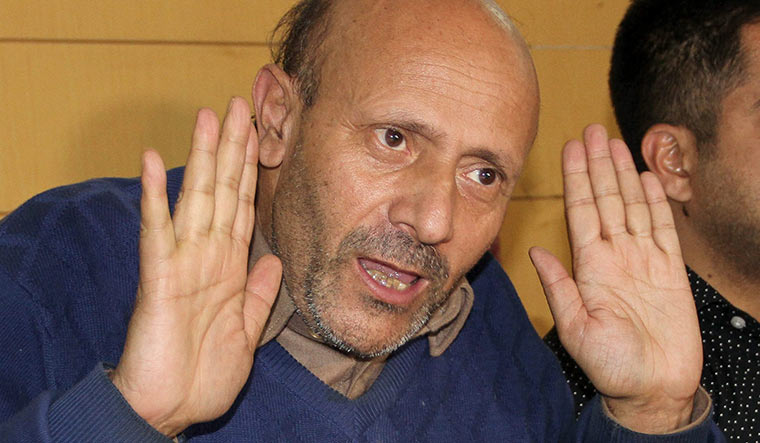Aunique campaign unfolded in the run-up to the Lok Sabha elections in Baramulla, where independent candidate Abdul Rashid Sheikh aka Engineer Rashid eventually trounced National Conference’s Omar Abdullah and Peoples Conference president Sajad Lone. Rashid, leader of the Awami Ittehad Party, ran his election bid from Tihar Jail. In his absence, his sons Abrar and Asrar campaigned for him.
The brothers, both in their 20s, led crowds with impassioned slogans. Each rally began with Abrar’s call: “Tihar ka badla (the revenge for Tihar is),” to which the crowd responded, “Vote se (by vote).” Abrar would continue the slogan with “Zulm (injustice) ka badla” and “Jail ka badla”, each of which would be met with the roaring response of “vote se”.
Rashid was arrested by the National Investigation Agency under the Unlawful Activities (Prevention) Act in 2019, yet his incarceration after the abrogation of Article 370 and advocacy for the rights of Kashmiris resonated with voters. It also demonstrated the power of the separatist or ‘boycott’ vote in the valley. At a rally in Seelo, Abrar said, “Mujhe pata hai aap boycott wale ho (I know you boycott elections). But promise me… this time, you will come out and vote.”
And, Baramulla saw a record turnout of 59 per cent, up from 35 per cent in 2019. Rashid won and how. “We had limited resources, and we always felt the absence of our father,” said Abrar. “But we tried to reach out to the people at the grassroots level, which has yielded results.” Rashid comes from Qalamabad in Langate, Kupwara. The former civil engineer was an aide of Hurriyat leader Abdul Gani Lone, Sajad’s father. In early 2000s, Rashid led a campaign against persecution of civilians by security forces in Langate. After Gani’s assassination in 2002, he was with Sajad. The two had planned to enter electoral politics in 2008, but Sajad backed out after the Amarnath land row agitation. Rashid contested and won the assembly elections as an independent. He was reelected in 2014, thanks to his soft separatist politics. In 2015, after a bill he moved to lift the ban on eating beef was not taken up for discussion in the assembly, he hosted a beef party in Srinagar, triggering a clash between him and BJP legislators. Rashid contested from the Baramulla Lok Sabha seat in 2019, but came third. Months later, Article 370 was revoked and Rashid was arrested. His victory is likely to establish him as a force to reckon with in the upcoming assembly polls.
Also Read
- PM Modi's challenge in third term is to reorient his image to that of a consensus builder
- Congress kept its ear and feet to the ground to script a remarkable resurgence
- Decoding Maharashtra poll verdict: Anger, sympathy and Sharad Pawar’s skilful moves
- How Mamata Banerjee and nephew Abhishek upped the poll game in Bengal
- BJP’s southern push comes a cropper in Tamil Nadu
- Voters have changed, and we have benefited: Suresh Gopi
His success stood out in contrast to the other victories across Jammu and Kashmir. In the Jammu region, BJP’s Jitendra Singh and Jugal Kishore Sharma clinched hat-tricks in the Udhampur and Jammu constituencies respectively, though with slimmer margins compared with 2019. In Srinagar, Aga Syed Ruhullah Mehdi of the National Conference outpaced Waheed Para of the PDP by 1.80 lakh votes. In Anantnag-Rajouri-Poonch, PDP president Mehbooba Mufti was defeated by Mian Altaf Ahmad of the National Conference by 2.81 lakh votes―the largest margin in the Union Territory.
In Ladakh, Mohmad Haneefa, an independent candidate representing the Muslim-majority Kargil, triumphed over the Congress’s Tsering Namgyal. Ladakh has been a cauldron of unrest over the denial of Sixth Schedule status and statehood since its designation as a Union territory. The split in the Buddhist vote between the Congress and the BJP paved the way for Haneefa’s success.
With Rashid and Haneefa winning the Lok Sabha polls, new political realities have come to the fore in the Union territories.


